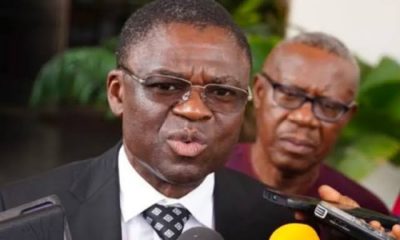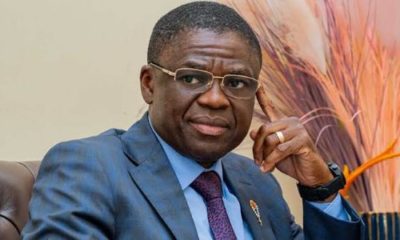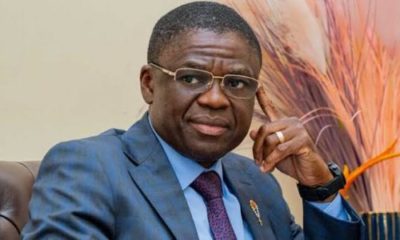International News
South Korean President Banned From Travel Amid Martial Law Backlash
South Korean President, Yoon Suk Yeol has been banned from leaving the country, the Justice Ministry confirmed Monday, following a week of political chaos triggered by his brief declaration of martial law.
The ban marks the first time a sitting president has faced such a restriction in the nation’s history.
Recall that on December 3, Yoon ordered special forces and helicopters to the National Assembly in an attempt to impose martial law.
RELATED NEWS: Martial Law: South Korea Opposition Files Impeachment Motion Against President Yoon
Lawmakers swiftly overturned the decree, forcing Yoon to rescind the order. Although he survived an impeachment motion on Saturday, public anger has continued to mount, with large protests demanding his resignation.
Authorities are now investigating Yoon and his close allies for their roles in last week’s events, including allegations of insurrection.
Among those facing travel bans are former Defense Minister Kim Yong-Hyun, who is in custody, and former Interior Minister Lee Sang-min.
General Park An-su, who led the martial law operation, and Defence Counterintelligence Commander Yeo In-hyung have also been barred from leaving the country.
General Park was questioned by investigators on Monday as the probe intensified.
Yoon’s impeachment failed after members of his ruling People Power Party (PPP) walked out of the National Assembly, denying the opposition the required two-thirds majority.
In exchange for their support, Yoon reportedly agreed to delegate his powers to the prime minister and the PPP chairman.
“This is an unlawful, unconstitutional act of a second insurrection and a second coup,” said Park Chan-dae, floor leader of the opposition Democratic Party.
Critics argue that Yoon’s decision to hand power to unelected officials violates the constitution.
“It seems to resemble an unconstitutional soft coup,” said Kim Hae-won, a constitutional law professor at Pusan National University.
“Their attitude of placing themselves above the constitution mirrors that of insurrectionist Yoon Suk Yeol,” added Park Chan-dae.
Despite Yoon’s apology for the “anxiety and inconvenience” caused by his martial law order, his approval rating has plummeted to 11%, according to a recent Gallup poll.
Opposition leaders have announced plans for a second impeachment vote on Saturday, with massive protests expected outside the National Assembly.
The PPP’s claim that Yoon can remain in office while delegating his powers to party officials has also been widely criticized.
“If there are issues with the president, the constitution lays out clear procedures, such as suspension or impeachment,” said Professor Kim Hae-won.
The ongoing crisis has raised concerns about South Korea’s leadership amid tensions with nuclear-armed North Korea.
The Defense Ministry confirmed Monday that Yoon remains the official commander in chief, despite questions about his authority.
“Legally, (control of military forces) currently lies with the commander in chief,” said Defense Ministry spokesperson Jeon Ha-Kyou.
International News
Martial Law: South Korean Interior Minister Resigns
South Korea’s Interior Minister, Lee Sang-min, has resigned amid ongoing investigations into the recent declaration of martial law that has plunged the country into political turmoil.
Lee announced his decision on Sunday, stating he was stepping down “in grave recognition of responsibility for failing to serve the public and the president well,” according to the JoongAng Ilbo newspaper. President Yoon Suk Yeol has accepted the resignation, the paper reported.
Both Lee and President Yoon are facing investigations for alleged insurrection following Tuesday’s controversial declaration of martial law. The decree, which drew sharp criticism domestically and internationally, was rescinded on Saturday after lawmakers overwhelmingly voted it down. President Yoon narrowly survived an impeachment motion during the same parliamentary session, adding to the growing scrutiny of his administration.
On Sunday, police arrested former Defense Minister Kim Yong-hyun, who oversaw the martial law operation.
Kim, who had already been placed under a travel ban, is being investigated for his role in implementing the decree.
International News
Martial Law: South Korean President Survives Impeachment
South Korean President, Yoon Suk Yeol narrowly avoided impeachment on Saturday after a brief and controversial declaration of martial law.
Despite widespread protests outside parliament, lawmakers from Yoon’s ruling People Power Party (PPP) boycotted the vote, effectively preventing the motion from reaching the required two-thirds majority for approval.
Yoon’s martial law declaration, which saw troops deployed to parliament, shocked the nation and drew international criticism.
RELATED NEWS: Martial Law: South Korea Opposition Files Impeachment Motion Against President Yoon
The decree, announced late Tuesday, aimed to “eliminate anti-state elements,” but was quickly reversed after a wave of backlash.
His party’s lawmakers staged a near-total boycott during the impeachment vote, resulting in its failure.
National Assembly speaker Woo Won-shik confirmed that the vote was invalid due to insufficient participation.
“The number of members who voted did not reach the required two-thirds majority,” Woo said. “It is very regrettable that a vote could not even be held on such a significant national issue,” he added, criticizing the PPP for its failure to engage in the democratic process.
The decision disappointed the massive crowds that had gathered outside parliament, with some protestors numbering up to one million according to organizers.
As PPP lawmakers left the chamber without voting, demonstrators expressed their frustration.
“Even though we didn’t get the outcome we wanted today, I am neither discouraged nor disappointed because we will get it eventually,” said Jo Ah-gyeong, a 30-year-old protester. “I’ll keep coming here until we get it,” she told AFP.
Opposition leaders vowed to continue their fight, promising to push for a new impeachment motion as early as Wednesday.
Many protesters also pledged to keep demonstrating until Yoon is removed from office. “I will impeach Yoon Suk Yeol, who has become the worst risk for South Korea, at any cost,” said opposition leader Lee Jae-myung.
Before the vote, Yoon, 63, apologized for the turmoil caused by his actions. “I caused anxiety and inconvenience to the public. I sincerely apologise,” he said, adding that he would leave decisions about his political future to his party. “I will entrust the party with measures to stabilise the political situation, including my term in office,” he said.
Despite Yoon’s apology, the PPP’s internal divisions remain apparent. Only three PPP lawmakers—Ahn Cheol-soo, Kim Yea-ji, and Kim Sang-wook—cast votes in favor of the impeachment motion.
The party defended its stance, saying it blocked the vote to avoid “severe division and chaos” and pledged to resolve the crisis in a “more orderly and responsible manner.”
Yoon’s approval rating has plummeted to a record low of 13%, and public frustration continues to mount.
“The public will not forgive him,” said 63-year-old retiree Lee Wan-pyo. “I just want him to step down,” said 70-year-old housewife Han Jeong-hwa.
The martial law episode, which included soldiers sealing off the National Assembly and helicopters landing on the roof, has drawn comparisons to South Korea’s autocratic past.
Nearly 300 soldiers were sent to lock down parliament, but MPs managed to resist the move, with some climbing walls to enter the building.
The martial law order was voted down after members of parliament successfully thwarted the military intervention.
As investigations into alleged insurrection unfold, experts suggest the failure of the impeachment vote signals a prolonged political crisis for Yoon.
“We will have a politically dead president—basically unable to govern any longer—and hundreds of thousands coming to the streets every week until Yoon is removed,” said Vladimir Tikhonov, a professor of Korean Studies at the University of Oslo.
The international community, including the United States, has expressed concern over the unfolding crisis.
U.S. Secretary of State Antony Blinken urged South Korea’s government to uphold democratic processes in a call with his Korean counterpart, Cho Tae-yul.
International News
Ghana Elections: Man Arrested With 76 Ballot Papers Amid Tight Race
Ghana’s elections were marred by controversy after a man was arrested in Atwima Foase for allegedly possessing 76 ballot papers.
Police have begun investigations to uncover his motives, while the Electoral Commission has reassured voters that the integrity of the electoral process remains intact.
The incident has heightened concerns about electoral malpractice as citizens cast their votes in a closely contested election.
In the Manhyia South Constituency, Dr. Matthew Opoku Prempeh, Vice Presidential candidate for the New Patriotic Party (NPP), exercised his franchise at the Apagyafie polling station.
READ MORE: Tragedy Averted As Borno Dep Gov, Others Escape Plane Mishap
Dr. Prempeh arrived at 8 a.m. with his wife, Almar Prempeh, his mother, Madam Akosua Nyarkoh, and other supporters.
“We must ensure our voices are heard through the ballot box,” he urged after casting his vote, encouraging Ghanaians to take part in the democratic process.
Meanwhile, tensions erupted in the Greater Accra Region’s Ablekuma West Constituency. At the Assemblies of God Church polling station, voters protested against food distribution allegedly linked to Member of Parliament Ursula Owusu-Ekuful of the NPP.
Doris Boakye, a party member, defended the act, stating, “We just brought breakfast for our polling agents and EC officials, but the NDC members are asking us to take the vehicle out. This is not for voters.”
The commotion prompted police intervention, leading to the removal of the food truck. Opposition supporters alleged that the act was an attempt to influence the election, adding to the day’s controversies.
As voting proceeds, the presidential race remains fiercely contested between Vice President Mahamudu Bawumia of the NPP and former President John Dramani Mahama of the National Democratic Congress (NDC). Both candidates made their final pitches to the electorate ahead of voting.
“Despite the challenges, we have performed better than the government of John Dramani Mahama,” Bawumia stated during his last campaign address.
Mahama countered with a vision for change, saying, “This election is a choice between the Ghana of today and the Ghana we want – a nation of opportunity, prosperity, and justice for all.”
The Electoral Commission has announced that results will be declared within three days.
However, if no candidate secures a majority, a second round of voting may be required.


















